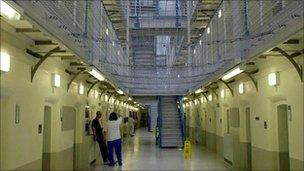Hugh Monro voices concern over prison rehabilitation
- Published

The inspection report called for more of a focus on rehabilitation
Scotland's chief prisons inspector has raised concern that jails are not doing enough to help stop offenders leading lives of crime.
Hugh Monro said, despite the amount of cash spent on rehabilitating criminals, prisons were not able to demonstrate how they were tackling the issue.
In his annual report, Mr Monro also said the smuggling of drugs and weapons into jails was "unacceptably high".
But he said prisons had "much of which to be justifiably proud".
The Scottish Prison Service said it was taking action to address the influx of drugs to its prisons, as well as intervention programmes to help offenders.
The Scottish government has made the rehabilitation of offenders one of its central justice policies, but Mr Monro said there was no system in place to be able to monitor how effective prison-based programmes were on inmates released into the community.
His report stated: "Without being able to track offenders when they are back in the community, it is almost impossible to measure the effectiveness of the various programmes and interventions to which they have been exposed in prison.
"When I ask prison governors how effective interventions have been in reducing re-offending and in changing a prisoner's behaviour, attitude and response for the better, they are unable to provide any clear evidence of what works.
"Given the amount of public money spent on the rehabilitation agenda, I find this an unsatisfactory state of affairs."
The chief inspector went on to again call for an overhaul of the drug-testing regime in jails and questioned whether prisoners being prescribed the heroin substitute methadone should be encouraged to reduce their dose.
He pointed out that 17.5% of prisoners released tested positive for drugs.
Staff 'diligent'
Mr Monro added: "The smuggling of drugs, mobile phones and weapons into prisons remains unacceptably high.
"This activity makes prisons less safe, enables criminal activity to continue and causes bullying and intimidation."
Labour, the Tories and the Lib Dems called for a full investigation into the level of drugs and drug use in Scottish prisons.
On the whole, Mr Monro believed Scotland's prison system was operating "safely and effectively".
He said: "Despite areas for improvement and development, the Scottish Prison Service has much of which to be justifiably proud and yet spends much of the time being unnecessarily defensive."
A Scottish Prison Service spokesman, said: "The SPS welcomes this report by Her Majesty's Chief Inspector of Prisons and is grateful that our prisons are well run and that our staff operate diligently, professionally and with commitment."
The spokesman added: "The SPS is not complacent about the challenges drug misuse presents and the SPS drugs misuse strategy, amongst other things, sets out to further improve security measures.
"In relation to rehabilitation of offenders, the SPS remains committed to providing the level of support that addresses the risks and needs of all offenders sentenced to custody.
"The SPS recognises the important contribution that specific interventions and activities can play in preparing offenders for release and in helping them break the cycle of reoffending."
- Published26 August 2010